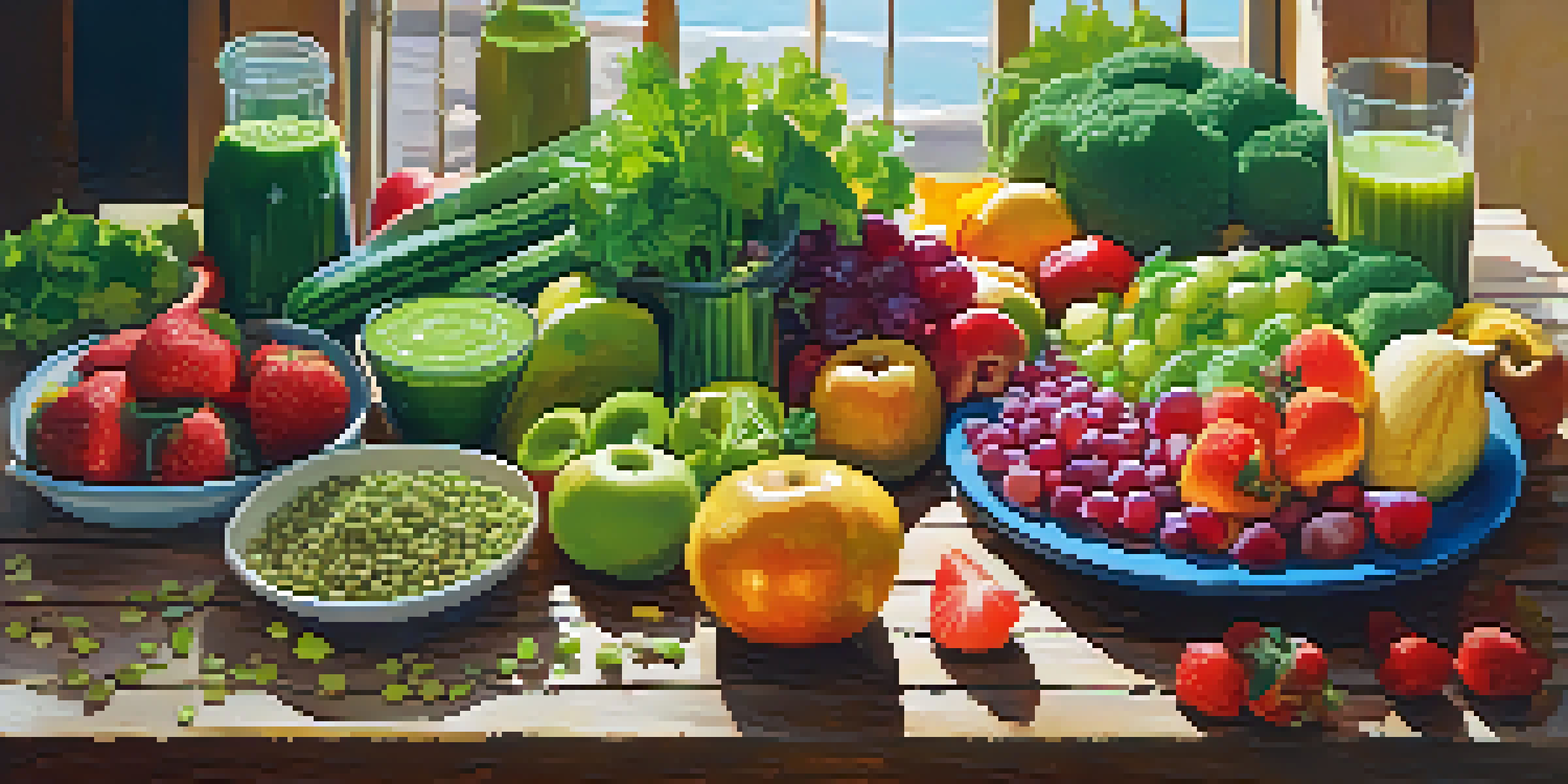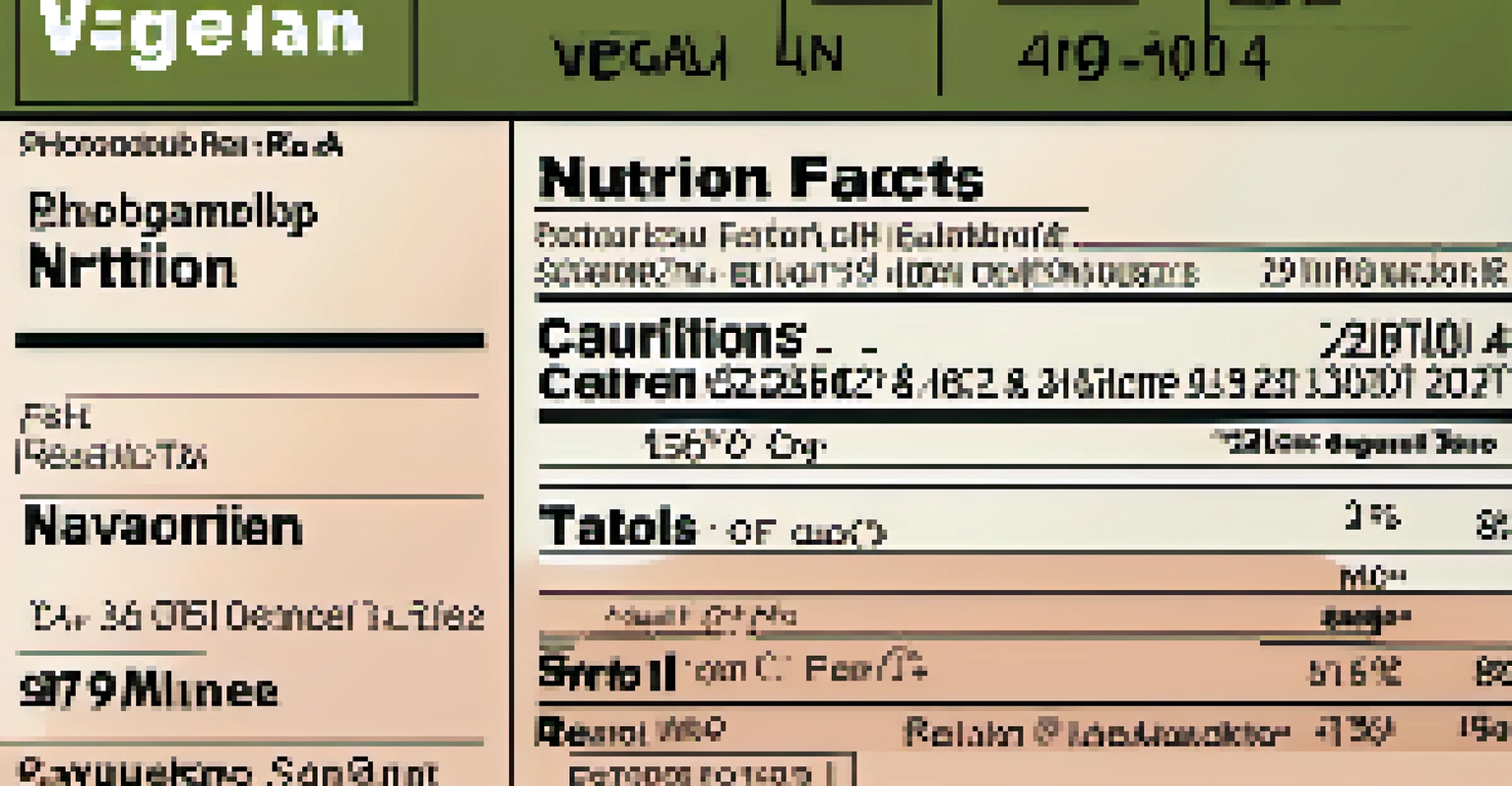Vegan Diet Basics: Understanding Nutrition Facts Labels

What is a Vegan Diet and Why It Matters
A vegan diet excludes all animal products, focusing on plant-based foods. This means no meat, dairy, eggs, or even honey. Adopting a vegan diet can offer numerous health benefits, including lower risks of heart disease and obesity.
The food you eat can either be the safest and most powerful form of medicine or the slowest form of poison.
Understanding the fundamentals of a vegan diet is essential for both health and ethical reasons. Many choose this path not just for personal health but also to reduce animal suffering and environmental impact. It's a holistic approach that benefits both individuals and the planet.
However, with this dietary shift comes the responsibility of ensuring you're getting all the necessary nutrients. This is where understanding nutrition facts labels becomes crucial, helping you make informed choices.
Decoding Nutrition Facts Labels: The Basics
Nutrition facts labels provide essential information about the food you consume. They include details on serving sizes, calories, and the amounts of different nutrients. For vegans, these labels help identify the right products that align with dietary needs.

A quick glance at the label can reveal if a product is high in sugars, fats, or sodium, which is important for maintaining a balanced vegan diet. For instance, a vegan snack might be low in calories but packed with unhealthy fats, rendering it less nutritious.
Vegan Diet: Health and Ethics
A vegan diet promotes health benefits while addressing ethical concerns about animal welfare and environmental impact.
Understanding how to read these labels will empower you to make better choices and avoid misleading marketing claims. By focusing on whole, minimally processed foods, you can nourish your body while adhering to your vegan principles.
Serving Sizes: Why They Matter
Serving sizes are often overlooked but play a crucial role in understanding nutrition labels. They tell you the amount of food that the nutritional information is based on, which can greatly affect your intake. For example, a label may state that a serving is just one cup, but if you eat two, you're doubling everything.
Let food be thy medicine and medicine be thy food.
Paying attention to serving sizes helps you keep track of your overall calorie and nutrient intake. It's especially important when choosing snacks or processed vegan foods, which can sometimes be misleading in terms of how much you should actually eat.
By being mindful of serving sizes, you can better manage your diet and avoid unintentional overeating. This awareness helps maintain a balanced and healthy vegan lifestyle.
Calories: Understanding Energy Needs
Calories indicate how much energy you get from a particular food item. For vegans, knowing your daily caloric needs is vital to avoid fatigue and ensure you have enough energy for your day-to-day activities. It's essential to find a balance that works best for your body.
Not all calories are created equal, though. A calorie from a whole food, like quinoa, offers more nutrients than a calorie from a processed vegan snack, which may be high in sugar and low in fiber. Focusing on nutrient-dense foods is key.
Reading Labels for Nutritional Insight
Understanding nutrition facts labels is essential for making informed choices and ensuring a balanced vegan diet.
Monitoring your caloric intake can help you maintain a healthy weight and energy levels. With the right approach, you can enjoy satisfying meals while staying within your caloric goals.
Macronutrients: Carbs, Proteins, and Fats Explained
Macronutrients are the building blocks of your diet: carbohydrates, proteins, and fats. Each plays a unique role in your health, and understanding their proportions in your meals is essential, especially on a vegan diet. For instance, while carbs are a great energy source, proteins are crucial for muscle repair.
When reading nutrition labels, you'll often see these macronutrients listed. Aim for a balanced intake to meet your body's needs, ensuring you get enough protein from sources like legumes, nuts, and seeds.
Additionally, healthy fats found in avocados and olive oil are also important. By focusing on a variety of whole foods, you can ensure your macronutrient intake supports your overall health.
Vitamins and Minerals: Essential Nutrients to Watch
Vitamins and minerals are vital for maintaining your body’s functions, and certain nutrients can be more challenging to obtain on a vegan diet. Key nutrients like Vitamin B12, iron, calcium, and omega-3 fatty acids often require extra attention. Reading labels helps you find fortified products or identify natural sources.
For example, Vitamin B12 is primarily found in animal products, so vegans need to look for fortified foods or supplements. Similarly, iron from plant sources is less easily absorbed, making it important to pair with Vitamin C-rich foods for better absorption.
Key Nutrients to Monitor
Vegans should pay special attention to vitamins and minerals like B12, iron, and calcium to maintain overall health.
Monitoring your intake of these essential nutrients ensures you stay healthy while adhering to a vegan lifestyle. It’s all about being proactive and informed.
Making Informed Choices: Ingredients to Avoid
When following a vegan diet, it’s crucial to be aware of ingredients that may not align with your dietary choices. Some products labeled as 'vegan' can still contain unhealthy additives, like excessive sugars, refined grains, or artificial flavors. Reading labels helps you avoid these pitfalls.
Additionally, some ingredients may seem vegan but are derived from animal sources, such as certain colorings or gelatin. By understanding common non-vegan ingredients, you can make more informed decisions at the grocery store.

Choosing whole, unprocessed foods is a great way to ensure you're getting the nutrients you need while avoiding unwanted additives. This not only enhances your health but also keeps your meals delicious and satisfying.